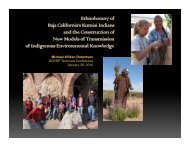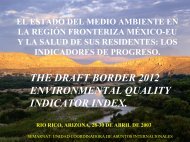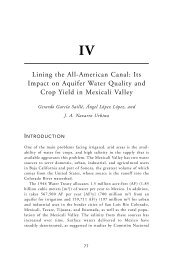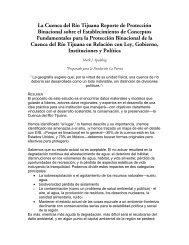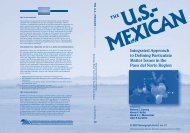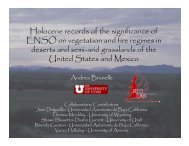Entire Book - Southwest Consortium for Environmental Research ...
Entire Book - Southwest Consortium for Environmental Research ...
Entire Book - Southwest Consortium for Environmental Research ...
Create successful ePaper yourself
Turn your PDF publications into a flip-book with our unique Google optimized e-Paper software.
Foreword<br />
But the trend <strong>for</strong> the future offers economic savings, environmental<br />
quality benefits, and human health improvements. Trades of<br />
emission reduction credits, as this volume demonstrates, allow<br />
industries an opportunity to conduct business more cost effectively<br />
while emitting less overall pollution in perpetuity, thus benefiting<br />
citizens by reducing health risks associated with hazardous air pollutants.<br />
While such international trades exist in several places around the<br />
world, none existed in the U.S.-Mexican border region when SCERP<br />
began its work early in 2000. Modeled after trades of acid rain precursors<br />
between Michigan and Ottawa, SCERP began a number of<br />
inquiries into the feasibility and practical concerns of dealing with<br />
an exchange. SCERP was in the position to facilitate such discussions<br />
after a decade of per<strong>for</strong>ming binational air quality research<br />
and outreach along the 10-state U.S.-Mexican border, and because<br />
of its well-established role as an organization of academic<br />
researchers.<br />
Because of SCERP’s work, one pollution reduction credit trade<br />
exists today and several others are possible. While they are not perfect,<br />
they do hold the promise of permanently cleaning the environment<br />
and clearing the air that people breathe.<br />
D. Rick Van Schoik, Managing Director, SCERP<br />
San Diego, Cali<strong>for</strong>nia<br />
July 2004<br />
vii




